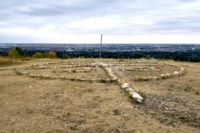Imposter syndrome focus of discussion
By Alejandra Pulido-Guzman - Lethbridge Herald on February 1, 2023.
 Herald photo by Alejandra Pulido-Guzman
Lethbridge college Exercise Science program instructor, Dawna Keith along with Founder and CEO of Massively Human Leadership, Kathleen Seeley talk to second year students and alumni about the imposter syndrome Friday morning at Lethbridge College.
Herald photo by Alejandra Pulido-Guzman
Lethbridge college Exercise Science program instructor, Dawna Keith along with Founder and CEO of Massively Human Leadership, Kathleen Seeley talk to second year students and alumni about the imposter syndrome Friday morning at Lethbridge College.LETHBRIDGE HERALDapulido@lethbridgeherald.com
Lethbridge College Exercise Science students, program alumni and members of the local business community sat down and discussed the ‘fake it ’til you make it’ approach and ‘imposter syndrome’ during a Coffee Klatch event Friday.
Exercise program instructor, Dawn Keith said this was the second time she sat down with students, alumni and guests to talk about their experiences after college.
“The beauty is to see the growth in our students after just a two-year program and how they’ve met their own pathway as a result of being in practicum with the wonderful stakeholders that we have here in Lethbridge,” said Keith.
She said that the first conversation happened in 2022 as a result of having to go through the COVID-19 pandemic in an industry that is very social.
“Last year, when school opened the third week of January, I started to make the requests and asks if alumni would be able to come in and speak to our students about what their experiences were prior to COVID,” said Keith.
 She said during their conversation last year, a topic that came up a lot was impostor syndrome and that is why they decided to focus the conversation around it this year.
Keith explained that Imposter Syndrome refers to a feeling of anxiety or self-doubt that a person experiences because they undervalue their competence and falsely attribute their success or accomplishments to external factors.
Founder and CEO of Massively Human Leadership, Kathleen Seeley took part of the conversation and explained the five archetypes of Imposter Syndrome.
She said one of them is “the perfectionist,” the one who thinks that if something is not perfect, then it is indicative of failure.
“Perfection stalls you because if you don’t start, if you don’t do anything until it’s perfect, you never get started. Instead of being perfect maybe just work towards excellence so it’s more forgiving and allows you to learn and grow,” said Seeley.
 She said another architype is “the expert” which people experience when they feel like they have to know it all before doing anything.
 “This stops you from speaking up in a meeting or asking questions. And I often say to people like what does it cost you to act like you know? It’s expensive, because we’re here to learn and grow. We can’t possibly know it all. We have to learn how to ask questions and kind of create a culture of learning,” said Steely.
She said the other archetypes are “the soloist” who feels like they have to do it all on their own, “the natural genius” who believe they can do something because they are born to do it, and if they are not born to do it they should not even try.
 “But what they forget about is the almost 10,000 hours of practice and commitment and passion that people put into it, they only see the end result. Becoming is better than being,” said Seely about the “natural genius” archetype.
She said the last one is “the superhuman,” the one who believes the more rules they have, the better they are, and competence is based on how many roles you can excel in at once.
 Seely said the key is to recognize these tendencies that we have, these stories we tell ourselves about what we need to be and how we have to be before we can participate.
 “Instead of seeing impostor syndrome as something to be dealt with, embrace the insecurity, feel it, and lean into the fear,” said Seely.
 She said people need to push the boundaries of their comfort in order to be able to grow.
One of the alumni who took part of the discussion was Will Sharpe, he said he benefited a lot from it last year as a student and wanted to take part in it to connect with the students going into their practicums as he was able to relate with them from being in their shoes recently.
“I think being there and providing that feedback and answering any sort of questions for them is pretty important and it makes it easier for them knowing that they can do it,” said Sharpe.
Follow @APulidoHerald on Twitter
23-22




